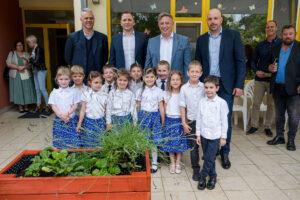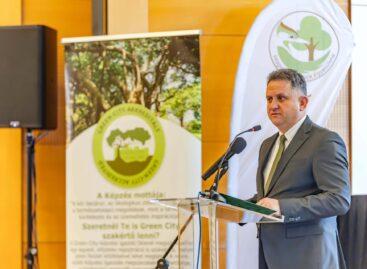NAK and PENNY have installed beds in schools and kindergartens
The National Chamber of Agricultural Economy (NAK), in cooperation with PENNY, installed raised beds in eight or eight elementary schools and kindergartens in Veszprém, as well as in the school in Nemesvámos. In this way, the children can get to know the process of growing vegetables and herbs up close, and the joy of growing plants.

(Photo: PENNY)
The National Agrárgazdasági Kamara (NAK) in cooperation with Penny-Market Kft. (PENNY) installed raised beds in 8 elementary schools and kindergartens in Veszprém, as well as in the school in Nemesvámos. In autumn, herbs (thyme, oregano, sage, chives, tarragon, lavender, rosemary) and strawberries were planted in the beds, and in spring, chives, parsley, sorrel, Swiss chard, chard, chives, peas and radishes were planted. NAK, as the originator and coordinator of the program, continuously helps the institutions with professional advice in the care and possible further propagation of the plants. “NAK wants to bring agriculture closer to children, so that, for example, people living in the city center or in housing estates can gain direct experience with growing plants and gardening. In this way, they not only meet vegetables and herbs in the shops, but they can feel the development of the plants every day, learning how to take care of them. We hope that many people will fall in love with this activity and in the future, as adults, will be oriented in this direction. But we are also happy if they will be able to appreciate the difficult but beautiful work of gardeners and farmers,” says Balázs Győrffy, the president of NAK.
It has been a priority for PENNY for years to increase the number of Hungarian products in its stores
Thanks to this, their relationship with domestic producers and suppliers is getting closer and closer. Today, nearly two-thirds of the goods are supplied by domestic suppliers, and more than 500 of their own-brand products bear one of the Hungarian Product trademarks. PENNY is also committed to social and environmental responsibility, so it was happy to support the raised bed installation project. “We have been contributing to the development of the Hungarian economy for 27 years now with our 229 stores served by our logistics centers in Karcag, Lower Némed, and Veszprém, so it is essential to draw attention to the importance of domestic production. We supported NAK’s project precisely because it starts attitude-shaping education at the youngest age group. In addition, we are happy to help the development of local initiatives and communities wherever we are, which is further strengthened by our connection to the city through our logistics center in Veszprém,” said Mathias Mentrop, PENNY’s Hungarian CEO, on the subject.
The implementation of the program was also supported by Mészi-Ker Kft. from Veszprém, Gyermekmosoly Nagycsáldos Egyesület from Várpalota, and TisztaZöld Kft. from Budaörs. Most of the planted vegetables can be “harvested” already in May-June, i.e. even in this academic semester, and they can also be used for the autumn “harvest” period. The crops can be processed in the cookery class, in the afternoon sessions, and in the technology class, and the children can even make salads and sandwich toppings from the grown plants. During cultivation, they can also learn about methods that can be used even on the balcony or terrace at home.
Related news
Walnuts are available at incredible prices
🎧 Hallgasd a cikket: Lejátszás Szünet Folytatás Leállítás Nyelv: Auto…
Read more >The Ministry of Agriculture pays special attention to supporting the horticultural sector
🎧 Hallgasd a cikket: Lejátszás Szünet Folytatás Leállítás Nyelv: Auto…
Read more >Related news
II. Green Gastronomy – Marketing Communication Workshop organized by the MMSZ HoReCa and Green Section
🎧 Hallgasd a cikket: Lejátszás Szünet Folytatás Leállítás Nyelv: Auto…
Read more >








